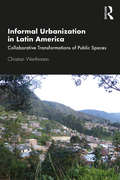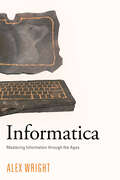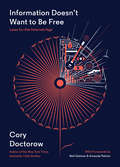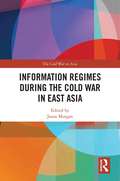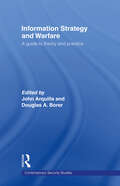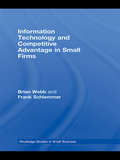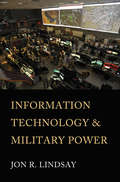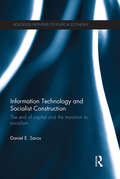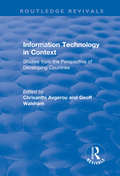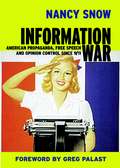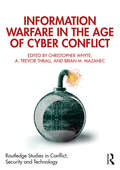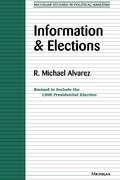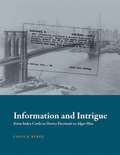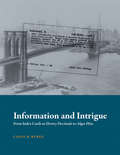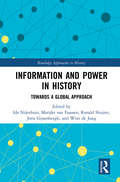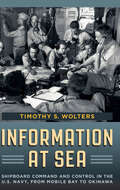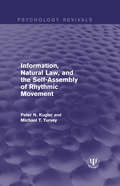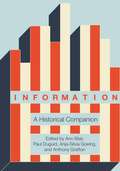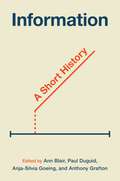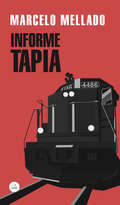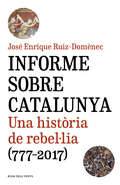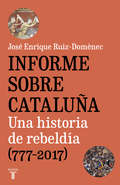- Table View
- List View
Informal Urbanization in Latin America: Collaborative Transformations of Public Spaces
by Christian WerthmannVarious kinds of informal and extra-legal settlements—commonly called shantytowns, favelas, or barrios—are the prevailing type of urban land use in much of the developing world. United Nations estimates suggest that there are close to 900 million people living in squatter communities worldwide, with the number expected to increase in the coming decades. Informal Urbanization in Latin America investigates prevailing strategies for addressing informal settlements, which started to shift away from large-scale slum clearance to on-site upgrading in Latin America over the last 40 years, by improving public spaces, infrastructure and facilities. The cases in this book range from one micro intervention (the Villa Tranquila Project in Buenos Aires) to three large-scale government-run projects: the celebrated Favela Bairro Program in Rio de Janeiro, the social housing program in São Paulo and the famous Proyectos Urbanos Integrales Approach in Medellín. The cases show a collaborative and sensitive transformation of landscape and public space, and provide designers and planners with the tools to develop better strategies that can mitigate the volatility that the residents of non-formal neighborhoods are exposed to. The book is a must-read for all who are interested or working in the global urbanization as well as social equity.
Informatica: Mastering Information through the Ages
by Alex WrightInformatica—the updated edition of Alex Wright's previously published Glut—continues the journey through the history of the information age to show how information systems emerge. Today's "information explosion" may seem like a modern phenomenon, but we are not the first generation—or even the first species—to wrestle with the problem of information overload. Long before the advent of computers, human beings were collecting, storing, and organizing information: from Ice Age taxonomies to Sumerian archives, Greek libraries to Christian monasteries.Wright weaves a narrative that connects such seemingly far-flung topics as insect colonies, Stone Age jewelry, medieval monasteries, Renaissance encyclopedias, early computer networks, and the World Wide Web. He suggests that the future of the information age may lie deep in our cultural past.We stand at a precipice struggling to cope with a tsunami of data. Wright provides some much-needed historical perspective. We can understand the predicament of information overload not just as the result of technological change but as the latest chapter in an ancient story that we are only beginning to understand.
Information Doesn't Want to Be Free
by Neil Gaiman Cory Doctorow Amanda PalmerIn sharply argued, fast-moving chapters, Cory Doctorow's Information Doesn't Want to Be Free takes on the state of copyright and creative success in the digital age. Can small artists still thrive in the Internet era? Can giant record labels avoid alienating their audiences? This is a book about the pitfalls and the opportunities that creative industries (and individuals) are confronting today - about how the old models have failed or found new footing, and about what might soon replace them. An essential read for anyone with a stake in the future of the arts, Information Doesn't Want to Be Free offers a vivid guide to the ways creativity and the Internet interact today, and to what might be coming next.
Information Fantasies: Precarious Mediation in Postsocialist China
by Xiao LiuWinner of the Science Fiction Research Association Book AwardA groundbreaking, alternate history of information technology and information discourses Although the scale of the information economy and the impact of digital media on social life in China today could pale that of any other country, the story of their emergence in the post-Mao sociopolitical environment remains untold. Information Fantasies offers a revisionist account of the emergence of the &“information society,&” arguing that it was not determined by the technology of digitization alone but developed out of a set of techno-cultural imaginations and practices that arrived alongside postsocialism.Anticipating discussions on information surveillance, data collection, and precarious labor conditions today, Xiao Liu goes far beyond the current scholarship on internet and digital culture in China, questioning the limits of current new-media theory and history, while also salvaging postsocialism from the persistent Cold War structure of knowledge production.Ranging over forgotten science fiction, unjustly neglected films, corporeal practices such as qigong, scientific journals, advertising, and cybernetic theories, Information Fantasies constructs an alternate genealogy of digital and information imaginaries—one that will change how we look at the development of the postsocialist world and the emergence of digital technologies.
Information Politics, Protests, and Human Rights in the Digital Age
by Mahmood MonshipouriWe live in a highly complex and evolving world that requires a fuller and deeper understanding of how modern technological tools, ideas, practices, and institutions interact, and how different societies adjust themselves to emerging realities of the digital age. This book conveys such issues with a fresh perspective and in a systematic and coherent way. While many studies have explained in depth the change in the aftermath of the unrests and uprisings throughout the world, they rarely mentioned the need for constructing new human rights norms and standards. This edited collection provides a balanced conceptual framework to demonstrate not only the power of autonomous communication networks but also their limits and the increasing setbacks they encounter in different contexts.
Information Regimes During the Cold War in East Asia (The Cold War in Asia)
by Morgan JasonMorgan and his contributors develop the concept of the Information Regime as a way to understand the use, abuse, and control of information in East Asia during the Cold War period. During the Cold War, war itself was changing, as was statecraft. Information emerged as the most valuable commodity, becoming the key component of societies across the globe. This was especially true in East Asia, where the military alliances forged in the wake of World War II were put to the most severe of tests. These tests came in the form of adversarial relations between the United States and the Soviet Union, as well as pressures within their alliances, which eventually caused the People’s Republic of China to break with from Moscow, while Japan for a time during the 1950s and 1660s seemed poised to move away from Washington. More important than military might, or economic influence, was the creation of "information regimes" – swathes of territory where a paradigm, ideology, or political arrangement were obtained. Information regimes are not necessarily state-centric and many of the contributors to this book focus on examples which were not so. Such a focus allows us to see that the East Asian Cold War was not really "cold" at all, but was the epicentre of an active, contentious birth of information as the defining element of human interaction. This book is a valuable resource for historians of East Asia and of developments in information management in the twentieth century.
Information Strategy and Warfare: A Guide to Theory and Practice
by John Arquilla Douglas A. BorerThis volume develops information strategy as a construct equal in importance to military strategy as an influential tool of statecraft.John Arquilla and Douglas A. Borer explore three principal themes:the rise of theinformation domain and information strategy as an equal partner alongside traditional military strategythe need to consider the org
Information Technology and Competitive Advantage in Small Firms (Routledge Studies In Small Business Ser. #Vol. 13)
by Brian Webb Frank SchlemmerDoes Information Technology matter? This book argues that even as Information Technology hardware, software, data and associated processes are becoming more of a commodity, it has never been more important to manage Information Technology as a strategic asset. However, managing Information Technology as a strategic asset is notoriously difficult, a
Information Technology and Military Power (Cornell Studies in Security Affairs)
by Jon R. LindsayMilitaries with state-of-the-art information technology sometimes bog down in confusing conflicts. To understand why, it is important to understand the micro-foundations of military power in the information age, and this is exactly what Jon R. Lindsay's Information Technology and Military Power gives us. As Lindsay shows, digital systems now mediate almost every effort to gather, store, display, analyze, and communicate information in military organizations. He highlights how personnel now struggle with their own information systems as much as with the enemy.Throughout this foray into networked technology in military operations, we see how information practice—the ways in which practitioners use technology in actual operations—shapes the effectiveness of military performance. The quality of information practice depends on the interaction between strategic problems and organizational solutions. Information Technology and Military Power explores information practice through a series of detailed historical cases and ethnographic studies of military organizations at war. Lindsay explains why the US military, despite all its technological advantages, has struggled for so long in unconventional conflicts against weaker adversaries. This same perspective suggests that the US retains important advantages against advanced competitors like China that are less prepared to cope with the complexity of information systems in wartime. Lindsay argues convincingly that a better understanding of how personnel actually use technology can inform the design of command and control, improve the net assessment of military power, and promote reforms to improve military performance. Warfighting problems and technical solutions keep on changing, but information practice is always stuck in between.
Information Technology and Socialist Construction: The End of Capital and the Transition to Socialism (Routledge Frontiers of Political Economy #184)
by Daniel E. SarosThe failure of command central planning in the twentieth century has led to a general disillusionment within the socialist movement worldwide. Some alternatives to capitalism have been proposed since the end of the Cold War, but none has offered an alternative form of economic calculation. This book explains how modern information technology may be used to implement a new method of economic calculation that could bring an end to capitalism and make socialism possible. In this book, the author critically examines a number of socialist proposals that have been put forward since the end of the Cold War. It is shown that although these proposals have many merits, their inability effectively to incorporate the benefits of information technology into their models has limited their ability to solve the problem of socialist construction. The final section of the book proposes an entirely new model of socialist development, based on a "needs profile" that makes it possible to convert the needs of large numbers of people into data that can be used as a guide for resource allocation. This analysis makes it possible to rethink and carefully specify the conditions necessary for the abolition of capital and consequently the requirements for socialist revolution and, ultimately, communist society. Information Technology and Socialist Construction will be of interest to students and scholars of political economy, the history of economic thought, labour economics and industrial economics.
Information Technology in Context: Studies from the Perspective of Developing Countries (Routledge Revivals)
by Chrisanthi Avgerou Geoff WalshamThis title was first published in 2000. A discussion of information technology (IT) in developing countries. The contributors can be considered to share the following set of broad premises: information and communication technologies, and related systems, have significant potential to aid the economic growth and improvement of social conditions in the developing world; however, such potential is not released by simply transferring technologies and processes from advanced economies; in order to better serve development needs, people involved with the design, implementation and management of IT-related projects and systems in developing countries must improve their capacity to address the specific contextual characteristics of the organization, sector, country or region within which their work is located. The text thus emphasizes the importance of context in examining the role and value of IT in the developing countries. It focuses attention on the fusion of the activities of "professionals" (technical experts, managers, policy makers) and "users" (more broadly, all other groups affecting or affected by the technologies and systems), with the intention of facilitating locally meaningful and effective change.
Information War: American Propaganda, Free Speech and Opinion Control Since 9-11 (Open Media Series)
by Greg Palast Nancy SnowIn Information War, former United States Information Agency employee Nancy Snow describes how U.S. propaganda efforts and covert operations are expanding more rapidly today than at any other time in U.S. history, as the Bush administration attempts to increase U.S. dominance by curbing dissent and controlling opinion. Snow lays out the propaganda techniques that the government uses to control dissent in the twenty-first century, spotlights the key players and their spinmeistering abilities in the information war, and describes memorable "leaks" in the Administration's efforts to conduct stealth propaganda programs and control information at home. Ultimately she shows that dissent and true democracy are the early casualties of these policies.
Information Warfare in the Age of Cyber Conflict (Routledge Studies in Conflict, Security and Technology)
by Christopher Whyte Brian M. Mazanec Trevor ThrallThis book examines the shape, sources and dangers of information warfare (IW) as it pertains to military, diplomatic and civilian stakeholders. Cyber warfare and information warfare are different beasts. Both concern information, but where the former does so exclusively in its digitized and operationalized form, the latter does so in a much broader sense: with IW, information itself is the weapon. The present work aims to help scholars, analysts and policymakers understand IW within the context of cyber conflict. Specifically, the chapters in the volume address the shape of influence campaigns waged across digital infrastructure and in the psychology of democratic populations in recent years by belligerent state actors, from the Russian Federation to the Islamic Republic of Iran. In marshalling evidence on the shape and evolution of IW as a broad-scoped phenomenon aimed at societies writ large, the authors in this book present timely empirical investigations into the global landscape of influence operations, legal and strategic analyses of their role in international politics, and insightful examinations of the potential for democratic process to overcome pervasive foreign manipulation. This book will be of much interest to students of cybersecurity, national security, strategic studies, defence studies and International Relations in general.
Information and Elections
by R. Michael AlvarezR. Michael Alvarez examines how voters make their decisions in presidential elections. He begins with the assumption that voters have neither the incentive nor the inclination to be well-informed about politics and presidential candidates. Candidates themselves have incentives to provide ambiguous information about themselves, their records and their issue positions. Yet the author shows that a tremendous amount of information is made available about presidential candidates. And he uncovers clear and striking evidence that people are not likely to vote for candidates about whom they know very little. Alvarez explores how voters learn about candidates through the course of a campaign. He provides a detailed analysis of the media coverage of presidential campaigns and shows that there is a tremendous amount of media coverage of these campaigns, that much of this coverage is about issues and is informative, and that voters learn from this coverage. The paperback edition of this work has been updated to include information on the 1996 Presidential election. Information and Electionsis a book that will be read by all who are interested in campaigns and electoral behavior in presidential and other elections. "Thoughtfully conceptualized, painstakingly analyzed, with empirically significant conclusions on presidential election voting behavior, this book is recommended for both upper-division undergraduate and graduate collections. " --Choice R. Michael Alvarez is Associate Professor of Political Science, California Institute of Technology.
Information and Intrigue
by Colin B. BurkeIn Information and Intrigue Colin Burke tells the story of one man's plan to revolutionize the world's science information systems and how science itself became enmeshed with ideology and the institutions of modern liberalism. In the 1890s, the idealistic American Herbert Haviland Field established the Concilium Bibliographicum, a Switzerland-based science information service that sent millions of index cards to American and European scientists. Field's radical new idea was to index major ideas rather than books or documents. In his struggle to create and maintain his system, Field became entangled with nationalistic struggles over the control of science information, the new system of American philanthropy (powered by millionaires), the politics of an emerging American professional science, and in the efforts of another information visionary, Paul Otlet, to create a pre-digital worldwide database for all subjects. World War I shuttered the Concilium, and postwar efforts to revive it failed. Field himself died in the influenza epidemic of 1918. Burke carries the story into the next generation, however, describing the astonishingly varied career of Field's son, Noel, who became a diplomat, an information source for Soviet intelligence (as was his friend Alger Hiss), a secret World War II informant for Allen Dulles, and a prisoner of Stalin. Along the way, Burke touches on a range of topics, including the new entrepreneurial university, Soviet espionage in America, and further efforts to classify knowledge.
Information and Intrigue: From Index Cards to Dewey Decimals to Alger Hiss (History and Foundations of Information Science)
by Colin B. BurkeAn account of Herbert Field's quest for a new way of organizing information and how information systems are produced by ideology as well as technology. In Information and Intrigue Colin Burke tells the story of one man's plan to revolutionize the world's science information systems and how science itself became enmeshed with ideology and the institutions of modern liberalism. In the 1890s, the idealistic American Herbert Haviland Field established the Concilium Bibliographicum, a Switzerland-based science information service that sent millions of index cards to American and European scientists. Field's radical new idea was to index major ideas rather than books or documents. In his struggle to create and maintain his system, Field became entangled with nationalistic struggles over the control of science information, the new system of American philanthropy (powered by millionaires), the politics of an emerging American professional science, and in the efforts of another information visionary, Paul Otlet, to create a pre-digital worldwide database for all subjects.World War I shuttered the Concilium, and postwar efforts to revive it failed. Field himself died in the influenza epidemic of 1918. Burke carries the story into the next generation, however, describing the astonishingly varied career of Field's son, Noel, who became a diplomat, an information source for Soviet intelligence (as was his friend Alger Hiss), a secret World War II informant for Allen Dulles, and a prisoner of Stalin. Along the way, Burke touches on a range of topics, including the new entrepreneurial university, Soviet espionage in America, and further efforts to classify knowledge.
Information and Power in History: Towards a Global Approach (Routledge Approaches to History)
by Ida Nijenhuis Marijke Van Faassen Ronald Sluijter Joris Gijsenbergh Wim De JongThe relationship between information and power is a relevant subject for all times. Today’s perceived ‘information revolution’ has caused information to become a separate object of study during the last two decades for several disciplines. As the contemporary perspective is dominant, information history as a discipline of its own has not yet crystallized. In bringing together studies around a new research agenda on the relationship between information and power across time and space, presenting various governance regimes, media, materials, and modes of communication, this book forces us to rethink the prospects and challenges for such a new discipline.
Information at Sea: Shipboard Command and Control in the U.S. Navy, from Mobile Bay to Okinawa (Johns Hopkins Studies in the History of Technology)
by Timothy S. WoltersThis is the first book to explore information management at sea as practiced by the U.S. Navy from the Civil War to World War II.The brain of a modern warship is its combat information center (CIC). Data about friendly and enemy forces pour into this nerve center, contributing to command decisions about firing, maneuvering, and coordinating. Timothy S. Wolters has written the first book to investigate the history of the CIC and the many other command and control systems adopted by the U.S. Navy from the Civil War to World War II. What institutional ethos spurred such innovation? Information at Sea tells the fascinating stories of the naval and civilian personnel who developed an array of technologies for managing information at sea, from signal flares and radio to encryption machines and radar.Wolters uses previously untapped archival sources to explore how one of America's most technologically oriented institutions addressed information management before the advent of the digital computer. He argues that the human-machine systems used to coordinate forces were as critical to naval successes in World War II as the ships and commanders more familiar to historians.
Information, Natural Law, and the Self-Assembly of Rhythmic Movement (Psychology Revivals)
by Michael T. Turvey Peter N. KuglerOriginally published in 1987, the introduction states: "the authors have successfully accomplished their program – to explain, based on physical representations, the observed relations among various parameters of wrist-pendulum oscillations. Thereby a set of new ideas and concepts, including those developed recently by the scientific school to which the authors belong, are introduced to biology. These concepts are closely related to the experimental data. This accomplishment makes the book especially attractive and demonstrates once more the productivity of applying physics to biology." "Clear language, simple figures, and physical examples illuminate rather complicated problems. These attractive features should make the book intelligible to a variety of investigators in the field of motor control, not only to the specialists with physical and mathematical education." From the foreword: " Kugler and Turvey have written strategic physical biology, and shown that, after all, dynamics (including both kinetics and kinematics) may support a unitary physical view of some of the profound operations of our brains… This is a grand start on what I hope is a larger program of demystifying behaviour."
Information: A Historical Companion
by Ann Blair, et al.A landmark history that traces the creation, management, and sharing of information through six centuriesThanks to modern technological advances, we now enjoy seemingly unlimited access to information. Yet how did information become so central to our everyday lives, and how did its processing and storage make our data-driven era possible? This volume is the first to consider these questions in comprehensive detail, tracing the global emergence of information practices, technologies, and more, from the premodern era to the present. With entries spanning archivists to algorithms and scribes to surveilling, this is the ultimate reference on how information has shaped and been shaped by societies.Written by an international team of experts, the book's inspired and original long- and short-form contributions reconstruct the rise of human approaches to creating, managing, and sharing facts and knowledge. Thirteen full-length chapters discuss the role of information in pivotal epochs and regions, with chief emphasis on Europe and North America, but also substantive treatment of other parts of the world as well as current global interconnections. More than 100 alphabetical entries follow, focusing on specific tools, methods, and concepts—from ancient coins to the office memo, and censorship to plagiarism. The result is a wide-ranging, deeply immersive collection that will appeal to anyone drawn to the story behind our modern mania for an informed existence.Tells the story of information’s rise from 1450 through to todayCovers a range of eras and regions, including the medieval Islamic world, late imperial East Asia, early modern and modern Europe, and modern North AmericaIncludes 100 concise articles on wide-ranging topics:Concepts: data, intellectual property, privacyFormats and genres: books, databases, maps, newspapers, scrolls and rolls, social mediaPeople: archivists, diplomats and spies, readers, secretaries, teachersPractices: censorship, forecasting, learning, political reporting, translatingProcesses: digitization, quantification, storage and searchSystems: bureaucracy, platforms, telecommunicationsTechnologies: cameras, computers, lithographyProvides an informative glossary, suggested further reading (a short bibliography accompanies each entry), and a detailed indexWritten by an international team of notable contributors, including Jeremy Adelman, Lorraine Daston, Devin Fitzgerald, John-Paul Ghobrial, Lisa Gitelman, Earle Havens, Randolph C. Head, Niv Horesh, Sarah Igo, Richard R. John, Lauren Kassell, Pamela Long, Erin McGuirl, David McKitterick, Elias Muhanna, Thomas S. Mullaney, Carla Nappi, Craig Robertson, Daniel Rosenberg, Neil Safier, Haun Saussy, Will Slauter, Jacob Soll, Heidi Tworek, Siva Vaidhyanathan, Alexandra Walsham, and many more.
Information: A Short History
by Ann Blair, Paul Duguid, Anja-Silvia Goeing, and Anthony GraftonAn essential guide to the ways information has shaped and been shaped by societiesThanks to recent advances, we now enjoy seemingly unlimited access to information. How did information become so central to our everyday lives? This book traces the global emergence of information practices and technologies across pivotal epochs and regions, providing invaluable historical perspectives on the ways information has shaped and been shaped by societies. Featuring the core articles from the ultimate reference book Information: A Historical Companion, this short history will appeal to anyone seeking to understand our modern mania for an informed existence. The book:Tells the story of information&’s rise from the premodern era to today, exploring how diverse cultures have created, managed, and shared facts and knowledgeTakes readers from the medieval Islamic world to late imperial East Asia, and from early modern and modern Europe to contemporary North AmericaCovers a broad range of topics, such as networks, bureaucracy, publicity, propaganda, censorship, privacy, intellectual property, digitization, telecommunications, storage and search, and much moreIncludes a new introduction, suggested further readings, and a glossary of key termsBrings together an international team of experts, including Jeremy Adelman, Devin Fitzgerald, John-Paul Ghobrial, Lisa Gitelman, Randolph C. Head, Richard R. John, Elias Muhanna, Thomas S. Mullaney, Carla Nappi, Craig Robertson, Daniel Rosenberg, Will Slauter, and Heidi Tworek
Informe Tapia
by Marcelo Mellado SuazoNueva edición revisada de la gran novela de Marcelo Mellado Leopoldo Tapia, maestro de educación básica y poeta con aficiones ferroviarias, recibe la misión de preparar un reporte sobre el acoso del que estaría siendo víctima -por parte de oscuros funcionarios públicos- la Asociación de Poetas de la Cuenca del Maipo, liderada por un tal Badilla o Padilla. El pormenorizado relato de este mundo, de las jergas en que se comunican sus personajes y de los modos en que operan, hace de Informe Tapia un fresco incomparable de un cierto Chile que bien podría ser Chile entero. Publicada originalmente hace quince años, esta novela es una pieza señera en el proyecto literario de Mellado, enfocado perspicazmente en la pequeñez humana -en particular la que puede surgir en el mundo burocrático y cultural-, pero siempre atento a la comicidad y la singularidad que son su correlato objetivo, de manera que la grisura no es aquí la tónica, sino más bien cierto tono carnavalesco, paródico, hilarante.
Informe sobre Catalunya: Una història de rebel·lia (777-2017)
by José Enrique Ruiz-DomènecInforme sobre Catalunya indaga, des de la perspectiva històrica, els motius que han portat Catalunya a la situació actual, i intenta respondre les preguntes sobre què va passar, en quin ordre i amb quins resultats, cosa que obliga l'autor a remuntar-se, en un apassionant recorregut, fins l'any 777, quan un fet que va tenir lloc al nord d'Alemanya va acabar marcant el curs de la història catalana. «Tretze segles d'història serveixen per entendre que determinades exigències de Catalunya tenen unes arrels més profundes del quesovint s'afirma. És un poble amb un afany de discrepància amb l'autoritat, ja vingui d'un rei franc del segle IX o d'un polític del segle XX.»José Enrique Ruiz-Domènec Com a conseqüència dels esdeveniments dels darrers anys, una part de la societat catalana ha optat per la ironia i una altra per la il·lusió per la República: és l'efecte de les emocions, esperances i conviccions col·lectives, però també de les decepcions, els enganys i les mentides. I en aquest informe detallat sobre el món vital de Catalunya en els darrers tretze segles, el lector trobarà la resposta a la pregunta que sovint ens plantegem: «Què ens passa?». Amb rigor i de manera amena, com en una òpera en tres actes, en aquest llibre es descriu com es va forjar un estil de vida i un amor a la terra, la casa i la família als confins del Regne franc fins a aconseguir el reconeixement amb el nom de Catalunya; després s'analitza la creació de la Corona d'Aragó, en què Catalunya va intentar encaixar les seves institucions i formes de govern amb més o menys encert; i finalment, es narra el desenllaç que es va produir quan ser i no ser Espanya es va convertir en el fonament de la realitat catalana, en el motiu de la divisió de la seva societat i en l'estímul de diverses recuperacions del passat. Tot això per arribar a avui dia, quan el caràcter històric de molts temes que plantegen els polítics reclama recórrer sense dilació als historiadors per fer-ne un bon diagnòstic.
Informe sobre Cataluña: Una historia de rebeldía (777-2017)
by José Enrique Ruiz-DomènecInforme sobre Cataluña indaga, desde una perspectiva histórica, en los motivos que han llevado a Cataluña a la situación actual, e intenta responder a las preguntas sobre qué pasó, en qué orden de factores y con qué resultados, lo que obliga al autor a remontarse, en un apasionante recorrido, hasta el año 777, cuando un hecho acaecido en el norte de Alemania acabó marcando el curso de la historia catalana. «Trece siglos de historia sirven para entender que determinadas exigencias en Cataluña tienen unas raíces mucho más profundas de lo que a menudo se afirma. Es un pueblo que se muestra afanoso de discrepar contra la autoridad, sea esta quien sea, un rey franco del siglo IX, un político del siglo XX.»José Enrique Ruiz-Domènec Ante los acontecimientos de los últimos años, una parte de la sociedad catalana ha virado hacia la ironía y otra hacia la ilusión de una República: es el efecto de las emociones, las esperanzas y las convicciones colectivas, pero también de las decepciones, los engaños y las mentiras. Informe sobre Cataluña aborda desde una perspectiva rigurosamente histórica, centrada en la política y la cultura, las diversas articulaciones de Cataluña y España desde la Edad Media hasta la actualidad. Como en una amena ópera en tres actos, en el libro se describe cómo se forjó un estilo de vida y un amor a la tierra, la casa y la familia en los confines del Reino franco hasta conseguir el reconocimiento con el nombre de Cataluña; luego se analiza la creación de la Corona de Aragón, donde Cataluña trató de hacer encajar sus instituciones y sus formas de gobierno con mayor o menor acierto; y, por fin, se narra el desenlace ocurrido cuando ser y no ser España se convirtió en el fundamento de la realidad catalana, en el motivo de la división de su sociedad y en el estímulo de las diversas recuperaciones del pasado. Todo ello hasta el día de hoy, cuando el carácter histórico de muchos de los temas que plantean los políticos requiere recurrir sin dilación a los historiadores para hacer un buen diagnóstico.
Informed Power
by Alejandra DubcovskyAlejandra Dubcovsky maps channels of information exchange in the American South, exploring how colonists came into possession of knowledge in a region that lacked a regular mail system or a printing press until the 1730s. She describes ingenious oral networks, and she uncovers important lessons about the nexus of information and power.
